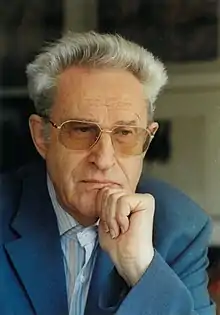Clytus Gottwald
Clytus Gottwald (born 20 November 1925) is a German composer, conductor and musicologist, focused on chorale music. He is known for his arrangements for a vocal ensemble of up to 16 voices. He founded and has conducted the Schola Cantorum Stuttgart for such music.

Life and work
Gottwald was born in Bad Salzbrunn. He studied voice with Gerhard Hüsch and choral conducting with Kurt Thomas. He studied musicology in Tübingen and Frankfurt. In 1961 he completed his dissertation on the Renaissance composer Johannes Ghiselin in Frankfurt. As a musicologist, he edited numerous scholarly catalogues of music manuscripts.
As a choir director, he was initially an assistant of Marcel Couraud from 1954 to 1958. From 1958 to 1970 he was cantor at the Paulus-Kirche, Stuttgart, conducting the Paulus-Chor Stuttgart.[1] In 1960 he founded the Schola Cantorum Stuttgart, a vocal ensemble of 16 to 18 professional singers, with a repertoire focused on both classical vocal polyphony as contemporary music, performing more than 80 premieres and first performances of choral works. Among the composers who wrote music for the ensemble are Pierre Boulez, Brian Ferneyhough, Vinko Globokar, Gérard Grisey, Heinz Holliger, Mauricio Kagel, Helmut Lachenmann, György Ligeti, Krzysztof Penderecki, Steve Reich, Dieter Schnebel, and Hans Zender. In particular, Gottwald conducted the Schola Cantorum in a performance of Ligeti's Lux aeterna which was later used in the Stanley Kubrick film 2001: A Space Odyssey. Gottwald directed the ensemble until the dissolution in 1990.
As a composer, Gottwald specialised in "arranging" classical music from different genres for an a cappella group of up to 16 voices in the style of György Ligeti. He had the initial idea at a workshop of Pierre Boulez, "transcribing" Ravel's Soupir from his Trois poèmes de Mallarmé similar to Ligeti's use of voices in Lux aeterna.[2] In particular, his arrangement of Gustav Mahler's Rückert song "Ich bin der Welt abhanden gekommen" for voices (1985) was made known by Swedish choral conductor Eric Ericson and has been repeated by many leading choirs. Gottwald arranged works by Alban Berg (Die Nachtigall), Hector Berlioz (Sur les lagunes), Claude Debussy (Les Angelus, Des pas sur la neige), Franz Liszt (Zwei Lieder, two songs), Gustav Mahler (Drei Lieder, three songs), Giacomo Puccini, Maurice Ravel (Soupir), Richard Wagner (Zwei Studien zu "Tristan und Isolde"), Anton Webern (Vier frühe Lieder, four early songs), Hugo Wolf (four songs including Auf ein altes Bild and Der Gärtner), among others. In his arrangements for voices, he used text freely, for example a combination of a French poem by Rilke with poetry by Mallarmé in his arrangement of Debussy's prelude for piano Des pas sur la neige. His adaptations of Wagner and Mahler were praised: "Gottwald has been truly effective at transferring the romantic orchestra onto the choir". His way of arrangement has been termed "re-create them in a magical choral world".[2]
In 2009 he received the Kulturpreis Baden-Württemberg (Cultural Award of Baden-Württemberg) for his lifetime achievement[3] and in 2012 the Preis der Europäischen Kirchenmusik of Schwäbisch Gmünd, for his contributions to sacred music.[4]
Selected recordings
as choral conductor
- Atelier Schola Cantorum. Neue Vokalmusik. Cadenza 800891–900. 10 CDs.
- Dufay, Ockeghem, Josquin, Brumel, Isaac: Musica Mensurabilis. Bayer Records 100271–274. 4 CDs.
- Nono: Ha venido, Canciones para Silvia (1960). WERGO WER 6038-2, 286 038-2
as composer
- Clytus Gottwald: Transkriptionen. SWR Vokalensemble Stuttgart, Marcus Creed. Carus 83.181.
- Clytus Gottwald: Vokalbearbeitungen. KammerChor Saarbrücken, Georg Grün, Carus 83.182. 2005.
- Choral Arrangements by Clytus Gottwald. The Rudolfus Choir, Ralph Allwood, Signum Classics SIGCD102 2007
Selected publications
- Johannes Ghiselin – Johannes Verbonnet: Stilkritische Untersuchung zum Problem ihrer Identität, Breitkopf & Härtel, Wiesbaden 1962, DNB-451628403 (Dissertation, University of Frankfurt 1961)
- „Hallelujah“ und die Theorie des kommunikativen Handelns. Ausgewählte Schriften. Klett-Cotta, Stuttgart 1998, ISBN 3-608-91923-6
- Rückblick auf den Fortschritt. Eine Autobiographie. Carus-Verlag, Stuttgart 2009, ISBN 978-3-89948-117-4
Literature
- Gottwald, Clytus in: Die Musik in Geschichte und Gegenwart. vol. 7, Bärenreiter, Kassel/Metzler, Stuttgart 2002, ISBN 3-7618-1117-9, pp 1409–1410
- Constance DeFotis: From the Work and Writings of Clytus Gottwald, Founder and Director of the Schola Cantorum Stuttgart. Dissertation, University of Cincinnati 1988
References
- "Clytus Gottwald". All Music. Retrieved 11 July 2012.
- Robert Hugill (2006). "Clytus Gottwald (b. 1925): Choral Transcriptions". musicweb-international.com. Retrieved 12 July 2012.
- "Preisträger Kulturpreis 2009" (in German). Stiftung Kulturpreis Baden-Württemberg. 2009. Retrieved 16 July 2012.
- "Preis der Europäischen Kirchenmusik 2012 - Clytus Gottwald" (in German). Schwäbisch Gmünd. 2012. Archived from the original on 16 August 2014. Retrieved 12 July 2012.
External links
- Literature by and about Clytus Gottwald in the German National Library catalogue
- Official site
- Clytus Gottwald Carus-Verlag
- Kulturpreis Baden-Württemberg
- "Öffentliches Gespräch mit Clytus Gottwald". State University of Music and Performing Arts Stuttgart. Archived from the original on 12 April 2013. Retrieved 21 March 2013.